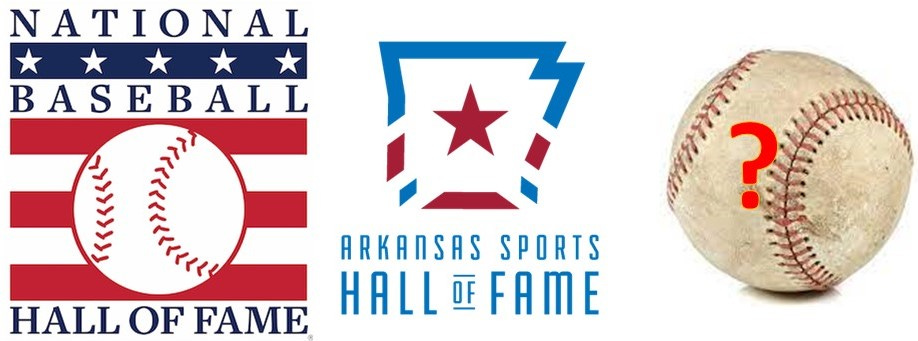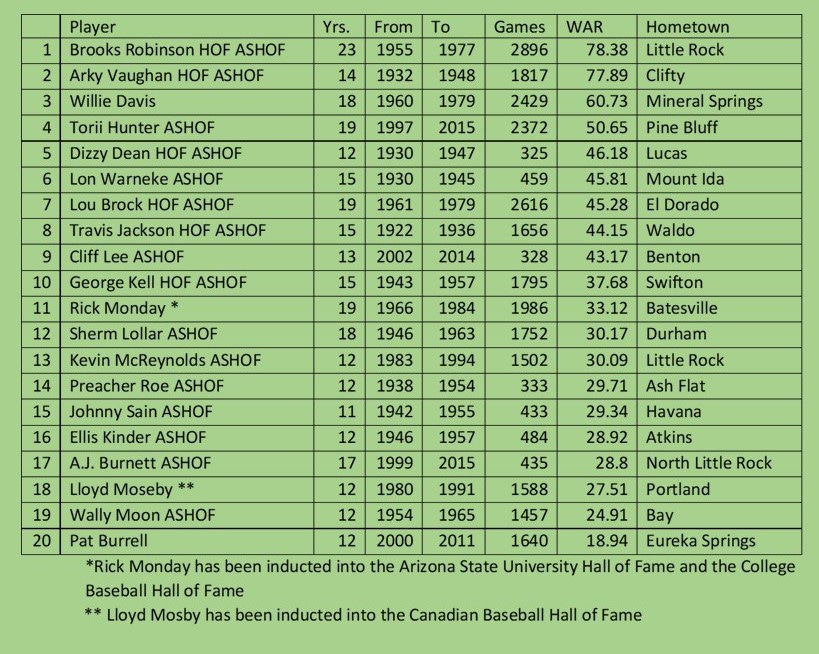3Dog and the Hall of Fame Backroads and Ballplayers #32
Stories of the famous and not-so-famous men and women from the days when baseball was "Arkansas' Game." Always free and always short enough to finish in one cup of coffee.
Mystery Man and the Arkansas Sports Hall of Fame
A couple of weeks ago I cast my ballot for the Arkansas Sports Hall of Fame. It takes me several days to overthink the choices and finally settle on a list that I submit, usually just moderately happy with my choices. Most years I want to vote for someone not on the ballot. More about that later in this post.
First, I should probably state that although some of my favorite old-timers are very unlikely to be inducted into the ASHOF, I have great respect for the folks in leadership positions with the Arkansas Hall. The process is open, out front, and unapologetically finance-driven. I can’t see anything as successful as the ASHOF without a reliable revenue stream.
In my work at overthinking and being particularly interested in baseball, I decided to see what Arkansas-born baseball player was the most lamentably passed over for the ASHOF. I already knew, but it is not that simple.
Last week I went down the rabbit hole that analytics creates in all baseball player evaluations and tried to utilize the work of baseball sabermetrician, Jay Jaffe. Jaffe has made a living quantifying worthiness for the Baseball Hall of Fame. Like most of the math guys who want to take the fun out of the “eye test” for greatness, Jaffe has a favorite metric. His is WAR (wins against replacement). Look it up, if you are so inclined. WAR is perhaps the most accepted ranking analytic in the sabermetrics catalog of evaluation tools. Baseball-Reference.com “explains” WAR. Enter at your own risk.
It has become a widely accepted practice in halls of fame that there are three ways to be worthy. One especially vague evaluation recognizes a career that features a period (not specified in length) when the player was historically outstanding at his position. Dizzy Dean and Sandy Koufax are the two most often cited examples.
Another subjective way to be acceptable to voters is to have made a uniquely significant contribution to the game. Buck O’Neil and Alexander Cartwright come to mind immediately.
The most common HOF criteria and the most measurable are career accomplishments and comparative statistics. WAR and Jaffe’s more complex JWAR, are examples of statistical and comparative analysis. JWAR amends WAR to take previous inductees into the formula.
The Arkansas Sports Hall of Fame gets a big check mark for inducting major league baseball players who are highly ranked by career WAR. In the top ten Arkansas-born major leaguers ranked by career WAR, the ASHOF has inducted nine. Only “mystery man” is not in the Arkansas Hall. At this point, do not go look for the mystery player. Give yourself a chance to guess correctly.
We will call the mystery man “3Dog” to refer to his credentials. He is third in career WAR among Arkansas-born big leaguers. 3Dog ranks above Torii Hunter, Dizzy Dean, Lou Brock, Cliff Lee, and George Kell. Have a guess yet? Do not give up and Google him yet.
3Dog played for several teams, one of which is among the most historically significant franchises in baseball history. He is this MLB team’s career leader in WAR for position players (59.6), at-bats (7495), runs (1004), hits (2091), total bases (3094), triples (110), and extra-base hits (585). He was in the top 20 in the MVP vote three times in an 18-year career. He was a two-time All-Star, and he has three Gold Glove trophies.
Before you shame those of us who are Arkansas Sports Hall of Fame voters for overlooking this great Arkansas-born player, consider the oversight of the Baseball Hall of Fame. The amazing 3Dog NEVER EVEN APPEARED on a Baseball Hall of Fame ballot.
I will come back to this complex Arkansas-born star in the last section of this post following some usual housekeeping and bill paying. If you guessed correctly let me know by email. backroadsballplayers@gmail.com
Housekeeping…
If you have missed some posts click here: Link to access past posts.
More of my stories in Only in Arkansas
If you want signed Hard Times and Hardball or Backroads and Ballplayers: Ordering instructions Link
Important…During the winter, Backroads and Ballplayers Weekly will only be available through free subscriptions or on the Backroads and Ballplayers Facebook page.
Christmas gift for dad
3Dog
If you guessed Rick Monday, that is a good guess. He ranks 11th in career WAR among Arkansas-born former major leaguers. Maybe you remembered Portland, Arkansas’ Lloyd Moseby. He is 18th in career WAR among Arkansans.
3Dog is William Henry Davis of Mineral Springs, Arkansas. Willie Davis was the Dodgers starting center fielder from 1961 to 1973. He averaged 172 hits, 28 stolen bases, and 9 triples over that period. Davis was also an outstanding center fielder, winning Gold Gloves in his last three seasons in LA. He made two All-Star teams, won three Gold Gloves, and played for two world championship clubs. Davis was one of the better all-around center fielders of the 1960s and early 1970s, but in his first year of Hall of Fame eligibility, he was inexplicably left off the Baseball Hall of Fame ballot. Since most Arkansans do not realize 3Dog (nicknamed for his three base hits) was born in Arkansas, those of us who vote for the ASHOF can be forgiven. His exclusion from the Baseball Hall ballot is not so easily excused. He remains the player with the highest career WAR never to be on the Baseball Hall of Fame ballot.
Below is a table listing the top 20 Arkansas-born players by career WAR. As you can see the ASHOF has done very well according to WAR. All four of the WAR top twenty, who have not been recognized by the ASHOF, left Arkansas at a young age.
Incidentally, there is no mention in the mission of the ASHOF that being born in Arkansas is a criterion for admission. “The primary purpose of the ASHOF is to honor and preserve the history of individuals and teams who have brought honor, prestige, and fame to the state of Arkansas through outstanding achievement, accomplishments, and contributions in amateur and professional sports.”
Willie Davis left Mineral Springs as a child and attended school in Los Angeles. Rick Monday also moved to California and graduated from Santa Monica High School. Monday had ancestors who were prominent players on Semi-pro teams in Independence County in the early decades of the 20th century.
Pat Burrell, who played 12 years in the big leagues grew up in San Jose. Lloyd Moseby spent more of his youth in Arkansas, but also moved to California and grew up in the Oakland area. He apparently has family in Portland, Arkansas.
"Most people don’t know I’m from Arkansas, but I’m proud to say I was born in Portland and lived there until I was 9 years old,” Moseby, 30, said this week when the Tigers came to Arlington Stadium to play the Texas Rangers. “I have a tremendous amount of ties there. A lot of my family still lives there.” Moseby’s parents moved his family to Oakland, Calif., when he was 9, but his mother –who died last year – and father moved back to Portland five years ago. “They wanted to move back to Arkansas and get away from the crowd, Moseby said. “They were tired of the city.” Arkansas Gazette 1990 -Caleb Hardwick Arkansas Baseball Encyclopedia.
Biographies of Monday and Davis, written by my friend Bill Pruden, can be found in the Encyclopedia of Arkansas.
Arkansas-born major leaguers ranked by WAR:







